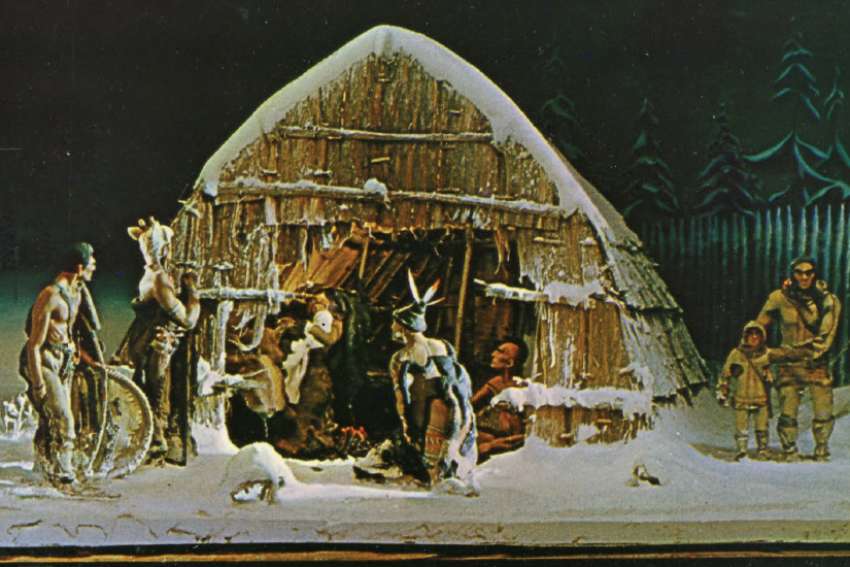Naturally, the earliest French settlers would have brought traditional songs of the season with them as they celebrated Christmas in the new land. Handel’s “Messiah” is perhaps the most frequently performed work in Canada, and has been for hundreds of years. The Canadian Encyclopedia notes that portions of “Messiah” were performed in Quebec as early as 1793.
But French explorers and settlers had been in Canada for more than 200 years by that point. And during those years, Christmas was a prominent annual celebration among these predominantly Catholic French expats, setting in motion the playing and singing of Yuletide carols, a tradition that carries on to this day.
The Canadian Encyclopedia notes the French carol “Chantons tous a la naissance” being sung at Midnight Mass in 1645, while the anonymous Christmas motet “Magnus Dominus,” known for its four-part mixed chorus with soprano and bass solos, is said to have been composed or at least known in Quebec around 1700.
Early English setters in Nova Scotia were not to be outdone in celebrating the season, as they also brought their own traditions, and variations of older English carols dominated the Christmas celebrations.
The Canadian Christmas carol that stands out for most is “The Huron Carol,” attributed to the Canadian martyr St. Jean de Brebeuf. It is widely considered Canada’s oldest Christmas song, originally written about 1642, and to this day remains the best-known homegrown carol.
Brebeuf wrote the lyrics in the native language of the Huron/Wendat people to whom he missioned near modern-day Midland, Ont., and the melody is based on the traditional French folk song “Use Jeune Pucelle” (“A Young Maid”). It’s original title is “Jesous Ahatonhia” (“Jesus, He is Born”), with its English lyrics written in 1926 by Jesse Edgar Middleton.
A more Canadian nativity you are unlikely to find. Brebeuf’s original uses Huron religious concepts as well as imagery familiar to our First Nations’ people, with Jesus born in a lodge of broken bark and swaddled in a robe of rabbit skin. Hunters replace the shepherds, and the Magi are chiefs from afar bearing gifts of fox and beaver pelts rather than gold, frankincense and myrrh. It also uses the word Gitchi Manitou for God.
One artist who continues to bring “The Huron Carol” to audiences nationwide is Indigenous actor and singer Tom Jackson, who founded The Huron Carole Benefit Concert Series in 1987. For years he has taken the tour from coast-to-coast-to-coast, raising funds and awareness for food banks, the Canadian Red Cross and agencies serving the homeless, addicted and marginalized in Canadian society.
While traditional carols have always been most popular, and remain so, there is a history of Canadian carols dating back to the mid-1850s, though the numbers are not large.
Scottish-born J.P. Clarke rose to musical prominence in Toronto mid-century where he was organist at St. James’ Anglican Cathedral and later conducted the Toronto Philharmonic Society. His “A Canadian Christmas Carol” is said to be the earliest carol published in Canada, appearing in January 1853 in Anglo-Canadian Magazine.
While Canadian carols have been few, the latter half of the 19th century saw a wide range of Christmas Masses composed in Canada, predominantly in Quebec. Joseph-Julien Perrault and Romain-Octave Pelletier were the most prominent composers, according to The Canadian Encyclopedia.
Other composers, by no means household names, continued the tradition into the 20th century — Clarence Lucas, Arthur Pointer, Geoffrey O’Hara, J.-Antonio Thompson and Alexandre d’Aragon among them. Godfrey Ridout even had his TV opera The Lost Child telecast on CBC in 1976.
Popular Canadian artists like Bryan Adams, Joni Mitchell, Corey Hart and children’s artist Raffi have released songs or albums for the season that continue to reinterpret traditional carols, but perhaps none has captured the true meaning of Christmas as The Band’s “Christmas Must Be Tonight,” with its chorus:
“How a little baby boy bring the people so much joy
Son of a carpenter, Mary carried the light
This must be Christmas, must be tonight.”
Written by guitarist and Toronto-born Robbie Robertson, The Band released the song in 1977. Robertson re-recorded the song for the soundtrack to the movie Scrooged in 1988. Robertson’s solo version remains a staple on classic rock airwaves during the Christmas season.


